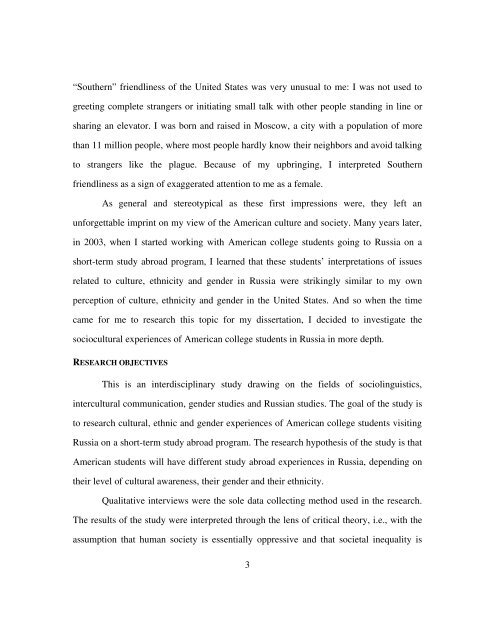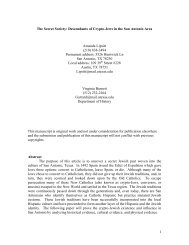Copyright by Tatiana Borisovna Segura 2008 - The University of ...
Copyright by Tatiana Borisovna Segura 2008 - The University of ...
Copyright by Tatiana Borisovna Segura 2008 - The University of ...
Create successful ePaper yourself
Turn your PDF publications into a flip-book with our unique Google optimized e-Paper software.
“Southern” friendliness <strong>of</strong> the United States was very unusual to me: I was not used to<br />
greeting complete strangers or initiating small talk with other people standing in line or<br />
sharing an elevator. I was born and raised in Moscow, a city with a population <strong>of</strong> more<br />
than 11 million people, where most people hardly know their neighbors and avoid talking<br />
to strangers like the plague. Because <strong>of</strong> my upbringing, I interpreted Southern<br />
friendliness as a sign <strong>of</strong> exaggerated attention to me as a female.<br />
As general and stereotypical as these first impressions were, they left an<br />
unforgettable imprint on my view <strong>of</strong> the American culture and society. Many years later,<br />
in 2003, when I started working with American college students going to Russia on a<br />
short-term study abroad program, I learned that these students’ interpretations <strong>of</strong> issues<br />
related to culture, ethnicity and gender in Russia were strikingly similar to my own<br />
perception <strong>of</strong> culture, ethnicity and gender in the United States. And so when the time<br />
came for me to research this topic for my dissertation, I decided to investigate the<br />
sociocultural experiences <strong>of</strong> American college students in Russia in more depth.<br />
RESEARCH OBJECTIVES<br />
This is an interdisciplinary study drawing on the fields <strong>of</strong> sociolinguistics,<br />
intercultural communication, gender studies and Russian studies. <strong>The</strong> goal <strong>of</strong> the study is<br />
to research cultural, ethnic and gender experiences <strong>of</strong> American college students visiting<br />
Russia on a short-term study abroad program. <strong>The</strong> research hypothesis <strong>of</strong> the study is that<br />
American students will have different study abroad experiences in Russia, depending on<br />
their level <strong>of</strong> cultural awareness, their gender and their ethnicity.<br />
Qualitative interviews were the sole data collecting method used in the research.<br />
<strong>The</strong> results <strong>of</strong> the study were interpreted through the lens <strong>of</strong> critical theory, i.e., with the<br />
assumption that human society is essentially oppressive and that societal inequality is<br />
3

















